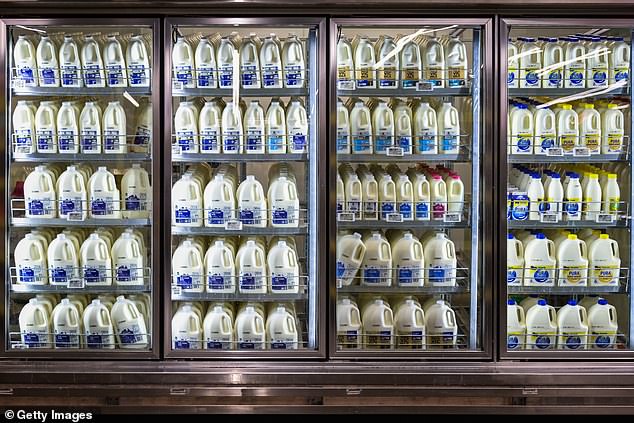If skim milk has always been your go-to because you think it’s the ‘healthier’ option, you might actually be better off drinking full cream instead.
Longevity doctor Poonam Desai, from New York, has revealed why she recommends her patients with no dietary restrictions drink regular cow’s milk instead of the skim alternative.
‘Here’s why I prefer whole milk over skim milk. I choose whole milk because the fat helps with better absorption of fat-soluble vitamins like A and D (which are often added back into milk),’ she explained.
‘The fat also helps slow down glucose spikes, making it a more blood sugar-friendly option.’
Dr Desai explained how the process of making skim milk can result in the loss of natural health benefits – including vitamins.
Most skim milk is typically made by spinning full cream milk in a centrifuge at high speed, forcing the fat to separate from the liquid.
‘To make skim milk, manufacturers take out the fat content. But with it, they also take out the healthy stuff like vitamins A and D. They then add them back in as an additive,’ she said.
‘I don’t know about you but I prefer to get my nutrients in its most natural form. Not only that, vitamins A and D are fat soluble vitamins.

If skim milk has always been your go-to for ‘healthy’ reasons, you might want to reconsider switching to full cream (file image)
‘What that means is they need fat for optimal absorption so skim milk has less fat, then it has vitamin A and D as an additive but it’s not even absorbed as well as the vitamins in whole milk.’
In Australia, skim milk, also known as fat-free milk, contains the lowest amount of fat and calories compared to other dairy milks, with no more than 0.15 per cent fat per 100g.
Despite offering less fat and fewer calories, Dr Desai explained why she avoids skim milk at all cost.
‘Skim milk is not good for your metabolic health because it causes a faster rise in glucose levels,’ she said.
‘Milk naturally has lactose, which is a carbohydrate and carbohydrates will spike your blood sugar but they will spike it even faster without fat content.
‘Fat content in whole milk helps curb that sugar high that comes when you have carbohydrates.
‘So if you ask me, I prefer to drink whole milk over skim milk because it provides better nutrient absorption and less of a glucose spike.’
Many long-time skim milk drinkers were surprised by the revelation, with one saying: ‘I knew whole milk was better for you but had no idea this was why.’
‘Wow. Very interesting,’ another shared.

Dr Poonam Desai has revealed why she prefers regular cow’s milk over the skim alternative
What is skim milk?
Skim milk can contain no more than 0.15 per cent milk fat.
When the fat is ‘skimmed’ or removed from the milk to create the ‘reduced fat’ and ‘skim’ versions, the overall volume of the product is reduced but the natural sugar content remains the same.
This means the percentage of lactose (and other nutrients) per 100g will be higher in skim and reduced fat versions as compared to full cream milk.
Source: Victorian Department of Health
Back in 2023, Dr Desai revealed she never cooks with a scratched non-stick pan after researchers found it can shed millions of tiny plastic particles, potentially contaminating the food.
‘I am a doctor and these are cooking pans I do not use: Scratched or chipped, non-stick cooking pans can leech millions of micro plastics into our food,’ Dr Desai said.
‘Microplastics are endocrine disruptors. They can cause hormone imbalances, fertility issues and even increase our risk of cancer.’
The medical expert said she avoids using damaged ceramic pans.
‘Scratched ceramic pans usually have a layer of aluminum under it and aluminum can leech into our foods,’ she said.
‘So for me if a pan is non-stick or ceramic, scratched or chipped I usually throw it out.
‘I usually opt for stainless steel or cast iron pans.’
In October 2022, scientists from the Newcastle and Flinders Universities discovered that up to 2.3 million microplastics can leak from damaged non-stick pots and pans.
‘It gives us a strong warning that we must be careful about selecting and using cooking utensils to avoid food contamination,’ Flinders University researcher Professor Youhong Tang previously said.
‘More research is recommended to address the risk assessment of the microplastics and nanoplastics.’